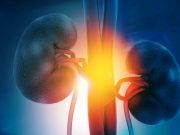Tag: Weight Loss Surgery and Bariatric
For Women With Obesity, Risk for Breast Cancer Drops After Bariatric Surgery
Surgical treatment benefit greatest in women with baseline insulin levels above the median
Sleeve Gastrectomy Beneficial for Obese Kidney Transplant Candidates
SG was followed by active listing in 37 of 54 patients; 20 patients received KT during 20.9 months after SG
Bariatric Surgery Tied to Higher Short-Term Risk for Venous Thromboembolism
However, at one and five years after surgery, risk for venous thromboembolism and pulmonary embolism was lower
Metabolic, Bariatric Surgery Provides Pathway to Transplant in ESRD
Among 10 patients who underwent MBS and then underwent subsequent transplantation, all transplants are currently functioning
A Number of Teens Meet Criteria for Metabolic, Bariatric Surgery
Male teens, Black and Hispanic teens, and those in more deprived neighborhoods more likely to meet MBS eligibility criteria
Type 2 Diabetes Remission Maintained After RYGB Despite Weight Regain
Overall rate of continued diabetes remission higher for those undergoing RYGB versus sleeve gastrectomy
BP Control Improved With Gastric Bypass in Patients With Obesity, Hypertension
Significantly higher rate seen for number of medications with at least a 30 percent reduction
Bariatric Surgeries Carry Low Perioperative Risks
Similar outcomes seen for laparoscopic sleeve gastrectomy and laparoscopic Roux-en-Y gastric bypass
Bariatric Surgery Tied to Slower Cognitive Decline in People With Obesity
No association seen between improvements in cardiometabolic risk factors and cognition
GERD Is Common Indication for Revisional Bariatric Surgery
Most patients requiring revision underwent sleeve gastrectomy as primary procedure; revisional surgery is most often RYGB














